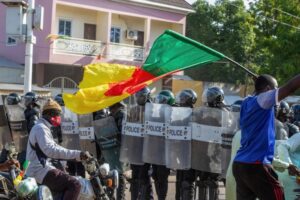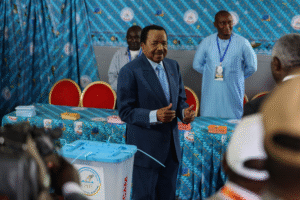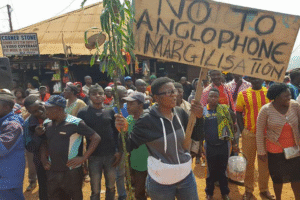We, the undersigned, express our deep concern and disappointment over the recent letter of congratulations purportedly issued in the name of the African Commission on Human and Peoples’ Rights (‘African Commission’) on 27 October 2025 to President Paul Biya of Cameroon following the disputed elections conducted on 12 October 2025. This letter compromises the impartiality and independence of the Commission as the continental institution whose mandate includes investigating and considering allegations of human rights violations that may arise in connection with the electoral process. As such, this act represents an incompatibility with the mandate of the Commission and a dangerous signal at a time when democracy, accountability, and respect for human rights are under severe threat across the continent and especially in Cameroon, where the authorities have already acknowledged the loss of lives during the post-electoral protests.
The African Commission was established to promote and protect human and peoples’ rights, not as an institution that endorses or legitimizes contested political outcomes. By congratulating President Biya — amid credible reports of election-related violence leading to verified fatalities — the Commission has, wittingly or unwittingly, undermined its credibility and betrayed both the letter and the spirit of the African Charter on Human and Peoples’ Rights. This letter risks eroding public trust in the Commission and the wider African human rights system, which already faces increasing skepticism from citizens who see impunity and selective engagement replacing principled leadership.
Across Africa, the democratic landscape is deteriorating at an alarming pace. The return of unconstitutional changes of government in several states, the weakening of independent institutions, and the manipulation of electoral processes have combined to create a climate of impunity and repression. In the absence of independent mechanisms to check the excesses of corrupt and authoritarian leaders, citizens across the continent have taken to the protests to demand accountability and reforms, often at great personal risk. These developments should have prompted the African Commission to take proactive, coordinated action to remind states of their obligations under both the African Charter on Human and Peoples’ Rights and the African Charter on Democracy, Elections and Governance. Instead, the Commission has chosen to issue congratulations that undermine the very values it is mandated to uphold. It is also worth noting that such congratulatory statements have not been standard practice for the Commission.
Four days after transmitting the letter of congratulations to President Biya, the Commission on 31 October 2025 issued a statement on the human rights situation in Cameroon in which it acknowledged “post-election violence and the resulting deterioration of the human rights situation”. The following day, the Commission issued a similar statement on the situation of human rights in Tanzania, in which it acknowledged “unrest has left hundreds of people dead, and hundreds injured, following clashes with security forces”. We note with regret that the elections in Cameroon — and in Tanzania — occurred during the Commission’s public session in Banjul. Yet, there was a conspicuous absence of engagement by the Commission, including its relevant Special Rapporteurs on human rights defenders, freedom of association and assembly, and the situation in Cameroon and Tanzania. The Commission’s conduct on this occasion sends confusing signals to the world and reflects a worrying pattern of disengagement at precisely the moments when its intervention is most needed.
These statements underscore the point that the letter of congratulations has damaged the Commission’s credibility and public standing. In this circumstance, we consider these statements insufficient in discharging the high burden on the Commission to clarify its position. Merely issuing a statement is insufficient. What is required is concrete action to uphold the sanctity of human life and dignity, particularly in the context of elections, and to restore confidence in the institution’s impartiality and integrity. The African people deserve institutions that act consistently, courageously, and transparently — particularly in defense of those whose rights are most under threat.
At a time when public faith in continental institutions is at its lowest since the adoption of the African Charter, the Commission must recommit to its founding mission. Trust, once broken, can only be rebuilt through truth, accountability, and visible action. The credibility of the Commission depends on its ability to prioritize the rights and dignity of African citizens over political convenience and deference to power. We therefore call on the Commission to take immediate corrective measures and to act in full fidelity to its mandate.
Recommendations
In light of the above, we, the undersigned organizations and individuals, call on the African Commission to urgently consider the following:
- Cease issuing Letters of Congratulations to Politicians or Candidates in Elections
Issuing congratulatory letters to candidates or politicians who have contested or run for public office compromises the Commission’s mission and falls outside its remit. The Commission should disclose its previous practice in this regard and publicly commit to discontinuing it, as it is antithetical to its mission and incompatible with the African Charter.
- Renewed Commitment to the African Charter:
The Commission should reaffirm its unwavering dedication to the principles of the African Charter on Human and Peoples’ Rights and the African Charter on Democracy, Elections and Governance, and resist any actions that dilute or contradict its protective mandate. - Investigate Electoral-Related Abuses:
The Commission should urgently initiate or support independent investigations into human rights violations, killings, and abuses that occurred during recent elections in Cameroon, Tanzania, and other states, in line with the African Charter on Human and Peoples’ Rights and the African Charter on Democracy, Elections and Governance.
- Strengthen Responsiveness and Proactivity:
The Commission must act with urgency and consistency in responding to emerging crises—particularly around elections and mass protests—both during its sessions and through the continuous work of its Special Rapporteurs and country rapporteurs. It should issue timely public communications, undertake fact-finding missions, and engage directly with state parties, including in the lead-up to elections, to prevent and respond to human rights violations, conflict-related sexual violence, killings, and abuses. Above all, the Commission must speak out firmly against the manipulation of electoral processes and the exclusion of legitimate political actors, such as the disqualification of opposition leader Tundu Lissu in Tanzania on unfounded high treason charges.
Africa stands at a critical crossroads. The continent’s human rights institutions must rise above political pressures and reclaim their role as defenders of justice and democracy.
Signed:
Civil Society Organizations:
- African Initiative of Women Human Rights Defenders
- Atrocities Watch Africa
- Centre de Documentation et de Formation sur les Droits de l’Homme (CDFDH)
- Centre for Human Rights, University of Pretoria
- Committee for Justice (CFJ)
- DITSHWANELO – The Botswana Centre for Human Rights
- Global Rights
- Initiative for Strategic Litigation in Africa (ISLA)
- Institute for Human Rights and Development in Africa (IHRDA)
- International Commission of Jurists (ICJ)
- International-Lawyers.Org (INTLawyers)
- Kenya Legal and Ethical Issues Network on HIV and AIDS (KELIN)
- KUTAKESA | Movimento dos Defensores de Direitos Humanos
- LCK Freedom Foundation
- Open Bar Initiative
- Pan African Lawyers Union (PALU)
- Robert F Kennedy Human Rights (RFK Human Rights)
- Synergía – Initiatives for Human Rights
- WILDAF/Mali (Women in Law and Development in Africa/Mali)
- World Organisation Against Torture
- Zimbabwe Lawyers for Human Rights (ZLHR)
- Human Rights Institute of South Africa (HURISA)
Individuals:
Godinho Cristóvão – Angola
Stanley Ibe – Nigeria
Chidi Anselem Odinkalu – Nigeria
Ikechukwu Uzoma- Nigeria
Dismas Nkunda – Uganda
Alioune Tine – Senegal
Ibrahima Kane – Senegal
Don Deya – Kenya
Isabella Mwangi – Kenya
Aimexe Amoussou – Benin
Professor Danwood Chirwa – Malawi
Dr Musa Kika – Zimbabwe
Adaobi Egboka- Nigeria
Ikeazor Ajovi Akaraiwe SAN – Nigeria
Kiiza Eron – Uganda
Amos Simpano – Kenya.
Humphrey Sipalla – Kenya
Lloyd Kuveya – Zimbabwe
Kaajal Ramjathan-Keogh – South Africa
Mary Pais Da Silva – Swaziland
Chepkorir Sambu – Kenya
Frans Viljoen – South Africa
Corlett Letlojane – South Africa
Cathy Kodiemoka – South Africa
Michael Gyan Nyarko – Ghana
Elsie Milimu – Kenya
Roselyn Hanzi – Zimbabwe
Tarisai Mutangi – Zimbabwe
Mai Aman – Sudan
Joy Bii – Kenya
Maria Lúcia Da Sirviera – Angola
Odi Lagi – Nigeria
Delma Monteiro – Angola
Félix Bom-Ano – Angola
Eduardo Tchipilica – Angola




